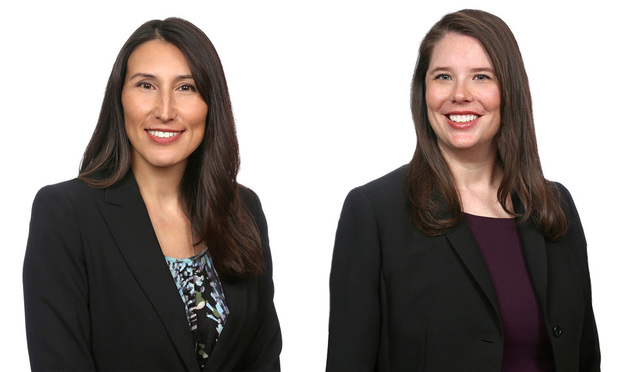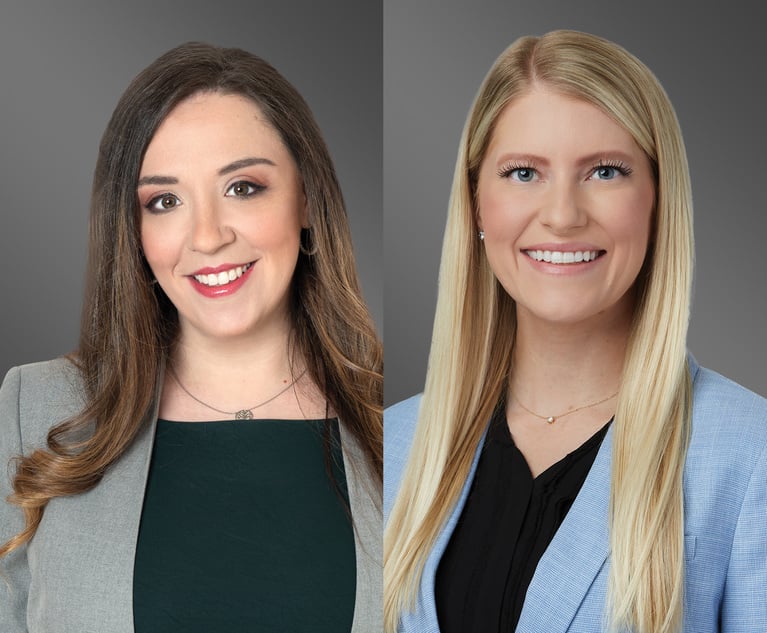Be Careful When Posting Client Information Online
When it comes to an attorney's obligation to maintain a client's confidential information, the relevant California statute does not mince words.
July 02, 2019 at 10:00 AM
6 minute read
 Shari Klevens, left, and Alanna Clair, Dentons. Courtesy photo
Shari Klevens, left, and Alanna Clair, Dentons. Courtesy photo
When it comes to an attorney's obligation to maintain a client's confidential information, the relevant California statute does not mince words. Business and Professions Code §6068(e)(1) provides that it is the duty of an attorney “[t]o maintain inviolate the confidence, and at every peril to himself or herself to preserve the secrets, of his or her client.”
Rule 1.6 of the California Rules of Professional Conduct further specifies that disclosure of such information is permitted only where the client provides informed consent or in other very limited circumstances. Nonetheless, despite the strict language, some attorneys play fast and loose when it comes to disclosing confidential information on social media. Now, in the (relatively) new world of social media, there is increasing awareness among firms and the bar as a whole that the same confidentiality rules apply to social media and blogging.
In 2018 the ABA's Standing Committee on Ethics and Professional Responsibility issued an opinion that attempted to provide clarity regarding the scope of an attorney's obligation to maintain client confidences when it comes to postings on blogs or other social media. In Formal Opinion 480, the ABA advised that “[l]awyers who blog or engage in other public commentary may not reveal information relating to a representation, including information contained in a public record, unless authorized by a provision of the Model Rules.”
The increasing focus on this issue has motivated many attorneys to tread carefully when it comes to discussing client matters on social media or other online settings.
The Scope of the Duty to Maintain Confidentiality
The ABA opinion confirms, as many lawyers already presumed, that confidentiality obligations apply equally to social media activity as they do in other circumstances. More noteworthy, however, is the breadth of those obligations as applied to social media, which may be broader than some attorneys realize.
Some attorneys may presume that once confidential information — such as client identity– is revealed publicly, that information no longer needs to be protected from disclosure in the same manner. However, Opinion 480 disagrees, and instead instructs attorneys to safeguard “information related to a representation, whatever its source and without regard to the fact that others may be aware of or have access to such knowledge.” Although different jurisdictions have enacted Rule 1.6 with variation, the opinion advises: “Rule 1.6 does not provide an exception for information that is 'generally known' or contained in a 'public record.'”
Thus, attorneys and firms may have an obligation to refrain from online commentary, even for those client or representation details that can be publicly confirmed from other sources.
The opinion additionally provides insight for attorneys considering whether providing a hypothetical situation runs afoul of Rule 1.6. This is a common technique for attorneys seeking guidance from others, or even in sharing real-life examples in seminars. However, attorneys in those situations will often take care to disguise their hypothetical well enough that a third party cannot ascertain the identity or situation of the client.
Exceptions to the Rule
As compared to other jurisdictions, Rule 1.6(b) of the California Rules of Professional Conduct and the related statute contain very limited exceptions to the prohibition on revealing confidential information. Specifically, absent informed consent, the rules permit disclosure only “to the extent that the attorney reasonably believes the disclosure is necessary to prevent a criminal act that the attorney reasonably believes is likely to result in death of, or substantial bodily harm to, an individual.”
By comparison, ABA Model Rule 1.6(b) provides a host of exceptions to the general prohibition on revealing confidential information. It allows lawyers to reveal confidential information to the extent necessary to prevent certain death or bodily harm, to prevent the client from committing a crime, to defend against a claim brought by the client, or to comply with a court order.
Whether in California or another jurisdiction, ABA Opinion 480 suggests that the exceptions are less likely to be at play when it comes to a lawyer providing online commentary: “because it is highly unlikely that a disclosure exception under Rule 1.6(b) would apply to a lawyer's public commentary, we assume for this opinion that exceptions arising under Rule 1.6(b) are not applicable.”
Thus, an attorney may consider whether client consent has been or can be provided before disclosing any potentially confidential information. Indeed, many attorneys who are unsure of what can be disclosed (or if the client would object to the attorney commenting on some publicly available information) will simply discuss the issue with the client to see if they consent.
Criticism of the ABA Opinion
Critics of the ABA opinion say that it implicates attorneys' First Amendment rights. Perhaps anticipating this criticism, the opinion notes that ethical rules impacting lawyers' public speech is nothing new. Indeed, lawyers' conduct may be “constitutionally constrained” by professional standards, such that lawyers may have “limited” free speech rights when it comes to client representations. Certainly, there are things that lawyers cannot say or do by virtue of their professional obligations.
In addition, critics have said that the opinion needlessly restricts lawyers from commenting on publicly available client information. According to some, if there is information that is published publicly (such as in a court order or pleading), it is no longer confidential and the attorney is no longer obligated to protect it. States have reached different conclusions regarding an attorney's obligation to protect information that has become public via other sources, so the impact of this opinion remains to be seen. Nonetheless, the ABA opinion and the relevant ethical rules may give attorneys reasons to be wary before posting any potentially confidential information online.
Shari L. Klevens is a partner at Dentons US and serves on the firm's US Board of Directors. She represents and advises lawyers and insurers on complex claims, is co-chair of Dentons' global insurance sector team, and is co-author of “California Legal Malpractice Law” (2014). Alanna Clair is a partner at Dentons US and focuses on professional liability defense. Shari and Alanna are co-authors of “The Lawyer's Handbook: Ethics Compliance and Claim Avoidance.”
This content has been archived. It is available through our partners, LexisNexis® and Bloomberg Law.
To view this content, please continue to their sites.
Not a Lexis Subscriber?
Subscribe Now
Not a Bloomberg Law Subscriber?
Subscribe Now
NOT FOR REPRINT
© 2025 ALM Global, LLC, All Rights Reserved. Request academic re-use from www.copyright.com. All other uses, submit a request to [email protected]. For more information visit Asset & Logo Licensing.
You Might Like
View All
What Will It Mean in California if New Federal Anti-SLAPP Legislation Passes?
9 minute read
For Growing Law Firms, Customizable Financing Can Unlock Opportunities
6 minute read
The Rise of Female Breadwinners: Challenging Traditional Divorce Dynamics
4 minute read
An Overview of Proposed Changes to the Federal Rules of Procedure Relating to the Expansion of Remote Trial Testimony
15 minute readTrending Stories
- 1Starbucks Hands New CLO Hefty Raise, Says He Fosters 'Environment of Courage and Joy'
- 2Blockchain’s Fourth and Fifth Amendment Privacy Paradoxes
- 3Prior Written Notice: Calabrese v. City of Albany
- 4Learning From Experience: The Best and Worst of Years Past
- 5Treasury GC Returns to Davis Polk to Co-Chair White-Collar Defense and Investigations Practice
Who Got The Work
J. Brugh Lower of Gibbons has entered an appearance for industrial equipment supplier Devco Corporation in a pending trademark infringement lawsuit. The suit, accusing the defendant of selling knock-off Graco products, was filed Dec. 18 in New Jersey District Court by Rivkin Radler on behalf of Graco Inc. and Graco Minnesota. The case, assigned to U.S. District Judge Zahid N. Quraishi, is 3:24-cv-11294, Graco Inc. et al v. Devco Corporation.
Who Got The Work
Rebecca Maller-Stein and Kent A. Yalowitz of Arnold & Porter Kaye Scholer have entered their appearances for Hanaco Venture Capital and its executives, Lior Prosor and David Frankel, in a pending securities lawsuit. The action, filed on Dec. 24 in New York Southern District Court by Zell, Aron & Co. on behalf of Goldeneye Advisors, accuses the defendants of negligently and fraudulently managing the plaintiff's $1 million investment. The case, assigned to U.S. District Judge Vernon S. Broderick, is 1:24-cv-09918, Goldeneye Advisors, LLC v. Hanaco Venture Capital, Ltd. et al.
Who Got The Work
Attorneys from A&O Shearman has stepped in as defense counsel for Toronto-Dominion Bank and other defendants in a pending securities class action. The suit, filed Dec. 11 in New York Southern District Court by Bleichmar Fonti & Auld, accuses the defendants of concealing the bank's 'pervasive' deficiencies in regards to its compliance with the Bank Secrecy Act and the quality of its anti-money laundering controls. The case, assigned to U.S. District Judge Arun Subramanian, is 1:24-cv-09445, Gonzalez v. The Toronto-Dominion Bank et al.
Who Got The Work
Crown Castle International, a Pennsylvania company providing shared communications infrastructure, has turned to Luke D. Wolf of Gordon Rees Scully Mansukhani to fend off a pending breach-of-contract lawsuit. The court action, filed Nov. 25 in Michigan Eastern District Court by Hooper Hathaway PC on behalf of The Town Residences LLC, accuses Crown Castle of failing to transfer approximately $30,000 in utility payments from T-Mobile in breach of a roof-top lease and assignment agreement. The case, assigned to U.S. District Judge Susan K. Declercq, is 2:24-cv-13131, The Town Residences LLC v. T-Mobile US, Inc. et al.
Who Got The Work
Wilfred P. Coronato and Daniel M. Schwartz of McCarter & English have stepped in as defense counsel to Electrolux Home Products Inc. in a pending product liability lawsuit. The court action, filed Nov. 26 in New York Eastern District Court by Poulos Lopiccolo PC and Nagel Rice LLP on behalf of David Stern, alleges that the defendant's refrigerators’ drawers and shelving repeatedly break and fall apart within months after purchase. The case, assigned to U.S. District Judge Joan M. Azrack, is 2:24-cv-08204, Stern v. Electrolux Home Products, Inc.
Featured Firms
Law Offices of Gary Martin Hays & Associates, P.C.
(470) 294-1674
Law Offices of Mark E. Salomone
(857) 444-6468
Smith & Hassler
(713) 739-1250






